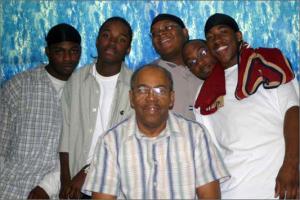[MenTeach: A great editorial in the New York Times – be certain to link to the site to read the comments – they are very interesting. Thanks to Roy for forwarding the article to me.]
Will Okun is a Chicago school teacher who traveled with Nick Kristof in June to central Africa, on the win-a-trip contest. He blogged and vlogged as he went, and you can see his reports at www.nytimes.com/twofortheroad. He teaches English and photography in a Chicago school with many students from low-income and minority homes.
In Charles Barkley’s book “Who’s Afraid of a Large Black Man”, Barack Obama recalls a few college professors asking him, “Man, why are you pretending that you’re not smart?” Obama continues, “And coming from black professors, especially, that was important, because I couldn’t throw back at them, ‘Oh, you don’t understand.’”
Looking back at his own educational experience, Obama concludes, “That’s a big part of the reason it is so important to have black teachers, especially black male teachers. I’m not saying exclusively, but in many situations you need someone who can call you on your stuff and say… that it’s not ‘acting white’ to read a book.”
I asked the teachers and the students at our all-black school if they believed there were fundamental differences between white teachers and black teachers.
Most of the white teachers agreed with me that race is not the defining factor in determining the effectiveness of a teacher. Regardless of race, a good teacher is a hard worker who maintains high expectations, cares about the students and is able to communicate the pertinent academic information in an accessible way.
About half the students in my class concurred that a teacher’s race was irrelevant in their own educational experience. Camilla wondered, “Why would a black teacher be able to teach the same math problem better
than a white teacher?” Jalil agreed, “The best teachers are the ones who are excited about what they are teaching … and who treat the students like they are special.” Many of these students wrote that their favorite or most influential teacher from previous schooling was white. In a remarkable tribute, three students unknowingly praised the same white 9th grade social studies teacher in their essays.
However, the other half of the class disagreed vehemently and argued that a teacher’s race plays a crucial role in the classroom. These students wrote about the importance of a “shared experience.” Mildred explained, “Black teachers know better where black students are coming from and so know how to better teach and explain lessons and ideas.” Darrel wrote, “Black teachers want more from us.” Anthony agreed, “Black teachers are harder on you. White teachers give up on you quicker.” Albert opined that “black students feel like they are being judged by white teachers,” and so “we will not ask or answer as many questions in a white class.” Ciarra concluded, “Black teachers just know how to relate better; they make the class more important to what is going-on in your life.”
The majority of black teachers also spoke of this “shared experience” in citing the importance of black teachers in black schools. As one teacher summarized, “Black students better identify with black teachers, and that connection enables a greater opportunity of teaching and learning.” In addition, a number of black teachers observed that white teachers have lower expectations for the black students as compared to the black teachers. More than one black teacher said that white teachers are too lenient with black students because the white teachers fear “being labeled as racists.” Also, several black teachers believed white teachers do not truly care for their students but are “just
building their resume for when they can go teach at some rich school in the suburbs.”
Although I am exhausted and frustrated, I am still passionate about teaching and I care deeply for the students I teach. I am saddened to consider that my race potentially limits my effectiveness in the classroom. But truth be told, I can feel an awkward disconnect between the students and me on an almost daily basis.
Whenever we read a book by a black author about black culture or the “black experience,” I feel disingenuous leading a class discussion about issues tied so directly to the lives of the students. What do I know of racism? What do I know of systematic poverty? What do I know of hunger? What do I know of a (perceived) limited future? What do I know of struggle? What do I know of gangs and random violence? What do I know of fear?
These are just ideas to me, facts and stories that I have studied in a book or observed from the safety of my own privileged distance. What can I tell them about their own lives? Can I or should I teach what I have never experienced?
I wonder if my students feel like I do when I am at a mandatory teacher training facilitated by a person who is not a
teacher. Teachers stare angrily at one another as yet another educational expert pontificates endlessly about how we can better educate our children. How dare these academics or bureaucrats advise us when they
themselves are not fighting and struggling in the classrooms on a daily basis? As anyone who ever attended graduate school knows, the theory and the practice of teaching are worlds apart.
How crucial is personal experience to knowledge and understanding? Can a white person honestly and effectively teach an African American studies course? Can a male teach a women’s studies class? Can a career academic teach a labor studies class? How do I teach “Native Son” next week?
To see comments and the original article go to http://kristof.blogs.nytimes.com/2007/11/08/understand/
To see more photos, please visit my website at www.wjzo.com
